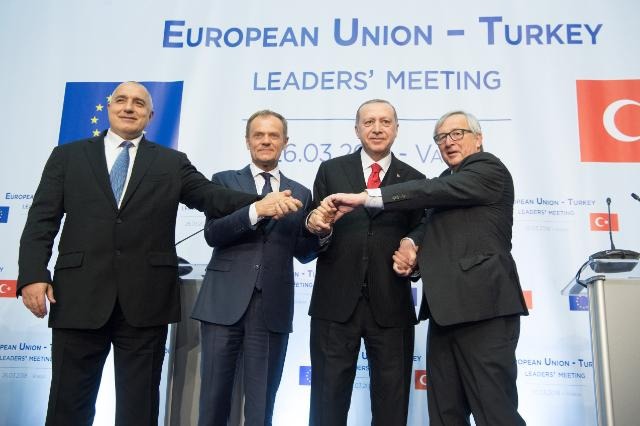The leaders attending the EU-Turkey meeting yesterday in Varna, Bulgaria, put on optimistic faces about common interests and solving outstanding issues by dialogue. But they could not hide the fact that they still disagree about Turkey’s accession to EU and its fight against terrorism inside and outside its borders. The meeting was hosted by Bulgarian Prime Minister Boyko Borissov, representing the Bulgarian Presidency of the EU, who had initiated the meeting in the hope of easing the current tension between the two sides.
It brought together European Commission President Jean-Claude Juncker, European Council President Donald Tusk and Turkey’s President Recep Tayyip Erdogan for a working dinner to discuss “all aspects of current and future EU-Turkey relations”.
The main points of discussion were cooperation in energy, security, the fight against terrorism, migration management and the EU's assistance for refugees in Turkey, where EU and Turkey share strategic interests.
As regards the refugee issue, both sides agree that the EU-Turkey agreement from March 2016 to end irregular migration flows from Turkey to EU has worked. According to recent EU figures, the number of irregular arrivals has decreased by 97 %, or almost one million people, and more than 1,000 have not lost their lives at sea.
EU has promised to support the needs of the Syrian refugees in Turkey with a total of €6 billion in two tranches, but for technical reasons only €1.85 billion has been paid out until now. The slow disbursement of funds causes concerns but Turkey was assured at the meeting that EU will honour its commitments.
Added to the agenda were recent developments in the region such as Turkey’s military intervention in northern Syria and its actions against Cyprus’ exploration of natural gas. On these issues the EU and Turkey are far apart.
The EU has condemned what it considers Turkey’s illegal actions against Cyprus. The European Council, contrary to the European Parliament, has been less outspoken on the incursion in the Kurdish enclave Afrin in Syria, but the Council clearly considers it an unprovoked and destabilizing action, which has worsened the humanitarian situation there.
At the press conference, president Erdogan said that he hoped that the state of negative relations between EU and Turkey was now behind them. He hoped that progress would be made in Turkey’s accession process, and that the visa liberalization agreement would soon be finalized.
He defended his country’s intervention in Afrin as a fight against terrorism that would also contribute to security in Europe and said that Turkey would continue its operations until the area has been purged from “terrorists”.
Juncker said it had been a meeting with “mixed feelings but not mixed messages”. He stressed that he always has supported Turkey’s application for the EU membership but that it was an “absolute must” for Turkey to improve its relations with EU member states, especially Cyprus.
He added that Turkey is sufficiently strong to cancel the state of emergency since the failed military coup in July 2016.
Summarizing the meeting, Tusk said that all issues had been discussed and that EU’s concerns had been raised, including the situation in Syria, but that no concrete compromise or solution had been achieved. “I still hope that it will be possible in the future. We are dedicated to continue our dialogue in difficult circumstances.”
The Brussels Times

